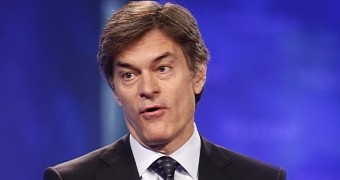This summer, the famous Dr. Oz appeared before the Senate Commerce, Science, and Transportation Committee, to answer the accusation that he was peddling “miracle” weight loss products that had no scientific basis and that, by so doing, he was deceiving his viewers into filling up the pockets of large companies who sold them this dream of rapid, effortless weight loss.
One product in particular that came up a lot in the conversation was the so-called guaranteed for weight loss green coffee bean extract, which Dr. Oz assured his viewers would help them lose up to 17.7 pounds (8 kg) in 22 weeks without changing their diet or doing exercise.
Dr. Oz wasn’t selling the weight loss supplement, and as far as we know, he was paid for his endorsement, but the manufacturer, Applied Food Sciences, Inc. (AFS) made a killing off what is known as “the Dr. Oz effect.”
AFS was selling fake promises based on a study they also faked
So, the Senate decided, even if he wasn’t directly making a profit off the AFS supplement, Dr. Oz was still responsible for using his huge platform to deceive viewers and perhaps even endanger their health. He could have used it to do good, to introduce people to healthier lifestyles, but he chose not to.
During the Senate hearings, it was even implied that Dr. Oz must have known that the claims he repeated, about the weight loss benefits of the product, were bogus.
Those for the green bean coffee extract have now officially been revealed as such, in a report by the FTC (Federal Trade Commission). Various complaints from customers led to an FTC investigation, which determined that the study used for the weight loss claims was fake.
According to the report, AFS hired researchers to conduct a study in India, but during that study, the same researchers constantly modified the participants’ weight and other measurements, disregarded whether they were on the placebo or not, and failed to respect the duration of the study.
Furthermore, the study claimed that participants lost the weight without diet and exercise, when, in fact, all of them had been advised to restrict their daily calorie intake and increase their workouts.
“Applied Food Sciences knew or should have known that this botched study didn’t prove anything,” Jessica Rich, director of the FTC’s Bureau of Consumer Protection, says. “In publicizing the results, it helped fuel the green coffee phenomenon.”
The AFS must pay for false advertising, but not Dr. Oz
The AFS must now pay $3.5 million (€2.76 million) as settlement for false advertising, with the FTC ruling that it will be liable for more if other complaints are filed in the future.
Meanwhile, Dr. Oz gets away with it, because no one can prove he made any money off the endorsement he provided for the company through the presentation of the supplement as a sure way to lose weight on his show.
This summer, Dr. Oz promised that he would try to be more responsible in his choice of products he presents on the show. With a viewership in millions, both on TV and online, he has a platform like few other television personalities, and all these viewers will buy whatever product he shows them, especially if it comes with his personal guarantee that it’s miracle weight loss in a pill or jar, or whatever shape it comes in.
Perhaps this ruling by the FTC will make these viewers second-guess everything that comes with the promise of diet-free, effortless weight loss, because healthy, sustainable weight loss never comes without hard work, discipline, and a change in diet, if only to remove processed and sugary foods.

 14 DAY TRIAL //
14 DAY TRIAL //